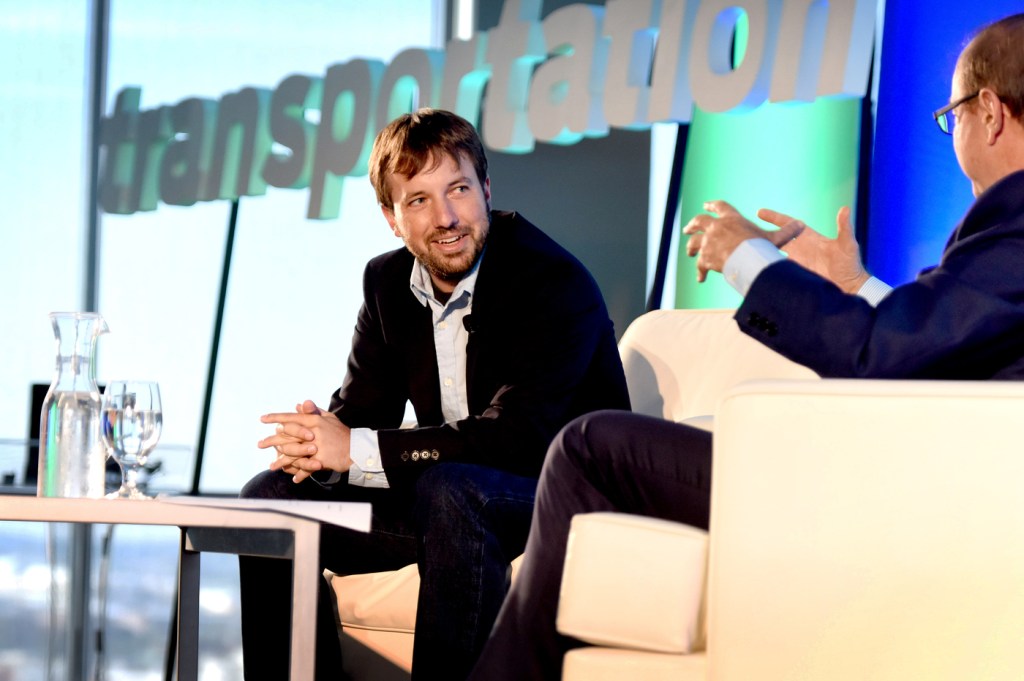Driving, autonomously, into the future

Self-driving cars are on the way, and they’re the future of Lyft, according to the company’s chief technology officer and Northeastern alumnus Chris Lambert. Within five years, Lambert said, a fully autonomous fleet of cars will provide the majority of Lyft rides across the country, while car ownership in major U.S. cities will be largely a thing of the past by 2025.
This technology means huge changes for people’s lives, and the physical environment of cities nationwide—as spaces now used for driving and parking can be freed up for parks and other desirable urban uses.
Lambert outlined the San Francisco-based ride-hailing company’s vision for the future of transportation on Tuesday as the keynote speaker at Northeastern’s presidential speaker series “The Future Of…” President Joseph E. Aoun hosts the series, which invites leading thinkers and innovators to campus to explore what’s on the horizon for the topics that shape our lives.
“The most exciting thing about this is not that there’s not a driver,” Lambert said, “but the economics of transportation becoming so much more affordable, as well as the changes in our cities that will make them so much more enjoyable.”

Lyft CTO Chris Lambert said the company envisions the country’s third transportation revolution as “transportation as a service”—following the boom of railroads and canals of the 19th century and of cars in the 20th century. Photo by Matthew Modoono/Northeastern University
Lyft launched in 2012, and moved into 2,000 U.S. cities and grew to 1,300 employees by 2015. It now provides 14 million rides per month. It has also launched Lyft Line, a real-time carpooling service at a reduced cost for users. Within six months it became the most popular ride type in San Francisco, Lambert said.
In January, Lyft announced a partnership with General Motors to launch an on-demand network of autonomous vehicles, and they are testing vehicles on the streets of San Francisco and Phoenix.
On Tuesday, Lambert presented the case for this future outlook amid the backdrop of some striking statistics: Americans’ second-highest household expense is transportation, they spend 30 billion hours commuting per year, and they only use their cars 4 percent of the time. He added that there are 700 million parking spots in the United States, enough to pave the state of Connecticut.
“That’s what we do with cars in the U.S.,” he said. “We spent a tremendous amount of money buying, servicing, and maintaining these vehicles, and only use them 4 percent of the time. And that’s because it was a necessity. There was no other option or alternative. But that’s starting to change.”
The most exciting thing about this is not that there’s not a driver, but the economics of transportation becoming so much more affordable, as well as the changes in our cities that will make them so much more enjoyable.
— Chris Lambert, Lyft CTO
Lyft, he said, envisions the country’s third transportation revolution as “transportation as a service”—following the boom of railroads and canals of the 19th century and of cars in the 20th century. This third revolution will be “more affordable, more accessible, and more enjoyable than car ownership,” he said. Rather than buying a car, there would be a subscription model.
The transition to autonomous vehicles will occur in phases as the technology improves, Lambert said. “This is not just our view,” he added. “The industry as a whole and regulators are recognizing this change.” He also pointed to President Barack Obama’s op-ed in the Pittsburgh Post-Gazette on Monday, in which he said, “In the seven-and-a-half years of my presidency, self-driving cars have gone from sci-fi fantasy to an emerging reality with the potential to transform the way we live.”
The keynote address marked a return to campus for Lambert, who earned his bachelor’s degree in computer science in 2007. During the event, Aoun asked Lambert to reflect on his career journey and time at Northeastern. Lambert, CIS’07, underscored the impact of his co-op experiences at Intel and Google, the latter of which he joined full time after college and spent five years as a software engineer, leading several engineering projects as part of Google Research, Google Mobile, and Google Maps. He later joined Lyft in November 2012 as an engineer and soon was promoted to CTO.
“One of the things I think I was really able to build through co-op was good communication skills, both written or working with teams,” he told Aoun. “That professional experience was very valuable.”
Our biggest competitor is actually behavior change. America is a country of car owners, and I think it’s going to take a lot of investment and awareness for us to get consumers to give up their cars. But I think transportation as service is happening.
— Chris Lambert, Lyft CTO
Following his talk, Lambert fielded questions from Facebook Live and a standing-room only audience in the East Village 17th floor event space. He said autonomous vehicle fleets will bring opportunities to reimagine cars’ cabin spaces that offer a range of new amenities to riders.
In response to a question asking whether this transition will work in cities such as Boston with windy roads and winter weather, Lambert said this underscores early challenges that will be faced and why over the next five to 10 years there will be a “hybrid network” of both self-driving and human-driving cars.
When asked about the competition, Lambert replied, “Our biggest competitor is actually behavior change. America is a country of car owners, and I think it’s going to take a lot of investment and awareness for us to get consumers to give up their cars. But I think transportation as service is happening. … When we first launched the Lyft service, I think a lot of people assumed you were crazy to get into an unmarked personal vehicle. But it happened and it took off.”
Past installments of “The Future Of….” series have featured Christian Rudder, OkCupid co-founder; Chris Kimball, the food media mogul and creator of America’s Test Kitchen; and Marty Baron, executive editor of The Washington Post. The next installment in the series—“The Future of Eating”—will be held on Nov. 18.





